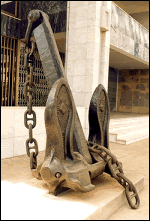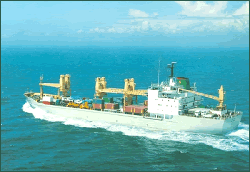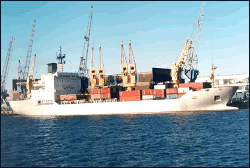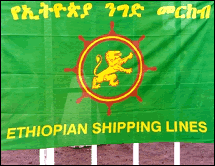Could you give a brief background of the Ethiopian Shipping Lines?
Ethiopian Shipping Lines is the only national carrier which competes with other international carriers. The Ethiopian Shipping Lines was established in 1964.

It was established by the Ethiopian government jointly with American company named Towers Investment from the District of Colombia, U.S.and with the Dutch management team in 1965. In the beginning three ships were built in Holland. The first three ships were called Queen Sheba, Lion of Judha and Lalibela and the operation was launched in 1966. Since then, ESL is giving four liner services. ESL has focused mainly on the designated line of import and export, so as to promote foreign trade and to give a dependable and uninterrupted service to the nation with the objective of sustainable market share. For the last thirty years , the operation has been profitable except during the closure of the Suez Canal. When Suez Canal was closed, the vessels had to go all around the Cape. The size of the vessels were not adequate for the trip. That was the time when ESL had a loss. Even then ESL had given the nation uninterrupted service ever since its establishment.
What has been the contribution of ESL to the nation's foreign trade?
Over 95 percent of foreign trade cargoes would have to be transported by sea which is the cheapest means of transport and Ethiopian Shipping Lines' share of the market has ranged from 60 to 40 percent. Previously ESL had 60 percent share, which later declined to 40 percent. The contribution is that at any given time, ESL has given a reliable service and also managed and regulated the freight rate. Importers and exporters have an option. At the beginning of the operation, all management staffs and ships crews were foreigners, now only 7% on board are expatriates officers. We have managed to establish overseas office in Rotterdam, and branch offices in Dubai and Djibouti. We have raised our capacity from 3 ships to 11 and we have bought recently another additional bigger semi container vessel. And we are giving service from the Red Sea to the North continent - a route which is over 33 years old - and also from the Red Sea to the Mediterranean (about 20 years old), from the Red Sea to the Far East (about 12 years old), and from the Red Sea to the Gulf about four years old. ESL owns the head office building which we operate from. And ESL is profitable at present, although the competitive environment becoming fierce and intensified.
Could you tell us the guidelines of your strategies to upgrade Ethiopian Shipping Lines services?
We are basically giving service to Ethiopian importers and exporters, thus our strategy is to build strong local market, with firm contact with our importers and exporters which gives us competitive advantage from others. We are trying to promote customer-oriented services with regular feedback and consultation with customers and try to fulfill their requirement. And also we try to consolidate our services by rearranging the trade route pattern towards the demand of our customers.
The performance of the ships is also closely controlled.

We are trying to take good care of cargo from our warehouses all over the world to deliver to the consignee. We are trying to work also on multi modal transport system that gives special container services from suppliers directly to the receiver in the hinterland. This definitely is advantageous to our customers. We are trying to have strong ESL representative network worldwide, and to this effect we are trying to select the best agents who will work on mutual benefits basis. We have a very strict control system over our agents because we have regional offices of our own. Italy controlling the Mediterranean , Rotterdam controlling the North-West Europe and Dubai controlling the Gulf and Indian sub-continent up to the Far East, while Djibouti controls the performance and efficiency of all vessels. We are trying to give services by being cost effective and we are giving a very low freight rate for Ethiopian export trade which is a break-even freight rate for export thereby encouraging Ethiopian export trade as well as utilizing unused spaces. We are trying to keep pace with technological advancement and containerization. We are more on a niche market and trying to fulfill also the requirements of all other sectors in the country. We have very versatile vessels and trying to introduce advanced information technology in to our systems, and we are the first to use e-mail in Ethiopia and trying to link all our agents through it. At present we are at the process of working to connect every cargo booking at all documentation processes. ESL is always checking its position with regard to the technical capacity, market share position, efficiency of its day-to-day activities and so on. For instance we have employed a consultant from U.K., Hyder Consulting Firm, to review the company. ESL is trying to improve the ships technical standards and recently have acquired the International Safety Management certificate. This is the certificate which shows management competency at shore and at sea. ESL is the only company which has got the certificate in the Eastern and South Eastern Africa.

This is going to be mandatory in the year 2000 for every shipping company but we have got it well before time. This is an achievement for ESL. Our quality service in the internationnal shipping trade has been evaluated by others and won the " Arch of Europe for Quality Award. We can say that the award is a prove to our efficient, depondable and reliable liner service for the awarder is an independent third party which has been operating in the world business for the last 25 years.
We are trying to improve our human resources and development system by giving internal in-house training, scholarships and we also train our staffs abroad. We are trying to build internal capability and effective organizational structure and we have slimed down our organization. We have decentralized our decision-making system, and continuing upgrading by seminars and training. We are trying to adequately manage our financial resources. Paying constant attention to focusing core activities and concentrating on its own strength, is the base for Ethiopian Shiping Lines success as a niche operator in our region. ESL is rated among the top 30% of the world shipping trade which we are proud of it and we use it as a spring board for consistant improvements of quality, safety services, and technical efficiency.
| On the time being, there is a conflict between Ethiopia and Eritrea. What has been and what are the influences on your activities?
Basically any conflict is not good for any country. The conflict erupted as ESL was using the port of Massawa and Assab of Eritrea. Now we are using the port of Djibouti. Previously the Djibouti port has been used not more than 20% as outlet of Ethiopian foreign trade. However, the best potential was in Djibouti. Due to the unexpected invasion, ESL has to shift all its activities to Djibouti. There was a surge hence anchorage delay and longer turn around of vessels. But later on programming and reorganizing mitigated these problems. Currently, ESL is using the Djibouti port 100 per cent.
Since Djibouti is a deep-sea port, there are competitors with big ships and they are taking cargoes which would be ESL cargoes. ESL is threatened by big shipping companies.
These big shipping companies carriers could give more competitive freight rate than ESL carriers utilizing economy of scale. Due to this, ESL freights rate has been reduced, but this is an advantage for the nation. Importers and exporters have more possibilities to export and import in cargo at competitive rate.
It is known that ESL has many partners and various activities. In which activities are you really interested in attracting investment and partners?
At present ESL's priority focus is providing export oriented services, for which nowadays a customer does not want to hassle and to worry. ESL wants to give to its customer a complete package service, from sea service to inland transport delivery and warehouse services. The majority of the cargo is coming to Addis Ababa and distributed from there. Recently ESL has acquired 34,000 square meters of land just at the outskirts of Addis for which ESL wants to give inland depot- a kind of dry port and bonded warehouse. This will give ESL upper hand over its competitors. In this complete-package-service provision investors are welcome to participate together with ESL. Furthermore, we are also open for any investor as a national carrier. If an offer comes from any investor we will consider positively.
Being a leading person in shipping sector and transport sector which is at the center of Ethiopia's economic development, as a more global question how confident are you in the future of your country?
I am very confident of my country and the conflict with Eritrea will not last long. It will not be beneficial to both of us. Ethiopia was known to be a country of famine but that story has been changed and we currently have over 400,000 tons of maize for export. Instead of exporting maize, Ethiopia could have corn oil or corn flacks if it has industries. It could export finished products rather than raw materials. There is a high potential not yet exploited and not touched which is ready for an investor.
Could you give to our readers a brief background of both your professional and work experience?
I am 48 years old. At the age of 18, I started serving in the ESL as a cadet. I have started from scratch - from cleaning toilets on board a ship to chief engineer on board a ship. From chief engineer I had to change my profession towards management, because I believe that managers with engineering background have got a very good sight. So I had to attend at a university in Sweden for my Masters degree in shipping management. I did my BA in engineering in Holland. In 1985, soon after I came back from Sweden, I became superintendent and then I became technical manager and now I have been a general manager for the last 4 years.
What is the secret of the style of your management?
The secret of my style of management is that, first of all you have human resources to consider from the lowest grade up to the highest management level.

I feel that everybody contributes to the success of the company. You have to accommodate all your work force and try to be open and frank. Every success and failure to be brought to the table, discuss with the concerned. I believe this is very important and it is also important to give seminars and training for officers and crew.
I firmly believe that every manager is a salesman for ESL. We have a sales department but everybody is a salesperson. I take this could be the reason for success because you have to feel the heartbeat of everybody. It is the people who make success or failure. It is important to go to the ships, to the agents and to meet at the port. I have meeting with every agent yearly. It is difficult to be profitable in this competitive shipping market with out hard work.
As a more personal issue, what has been your most satisfying personal achievement since you were general manager of shipping lines?
I have managed to increase the salary of our crews to a reasonable and acceptable pay levels. I have introduced a set of manuals for everybody's application. I started from the acquisition of the land on which our office is erected. Managed to maintain the trade even in the turbulent times.
And finally, what would be your final message to our readers?
This is an African company with a very high and recognized standard competing with international carriers. This is a national carrier that abides by the laws of the nation. We give a reliable service for all of our customers. Shipping is a very risky venture in which a lot of fraud is exercised. As a national carrier, we are issuing a national shipping lines Bill of Lading for which you can be 101 percent sure that your cargoes safely arrive at the scheduled destination. This is the most important one that customers should be aware of.
 ESL OVERSEAS OFFICES ESL OVERSEAS OFFICES |
NETHERLANDS
Overseas Representative Office
P.O.Box 23118
3001 KC Rotterdam
Tel: 31-10-4137455
Fax: 31-10-4133491
Tlx: 24123
ERITREA
Coordinating Office Assab (COA)
P.O.Box 306
AssabTel: 291-4-661318
Fax: 291-4-661319
ITALY
Mediterranean Service Coordinating Office
C/O Fratelli Cosulich S.P.A
Piazza San Antonio 4
34122 Trieste
Tel:39-40-6797132/6797133
Fax:39-40-662150; Tlx: 460018
Local Agent
ETHIOPIA
Maritime & Transit Services Ent.
P.O.Box 1186, Addis Ababa
Tel: 251-1-510666
Fax: 251-1-514097
Tlx: 21290/21310 |

